Philosophy Things by Michelle G. '18
liberty, property, consent - that kind of stuff
Economics is a weird kind of science. Like biologists or chemists, economists are of course concerned with gathering empirical data to support or refute their theories about the world. But unlike the hard sciences, which deal in the habits of atoms and molecules, economics explores those of the Human – a totally different beast with a whole different set of considerations to cover. Correspondingly, economists deliberate on an additional type of question, the normative (as opposed to the “positive”) or the ought (as opposed to the “is”). Basically, positive economics explores questions regarding how a society is, fueled by familiar scientific practices of devising models and gathering evidence for and against them. The normative component of the discipline, in contrast, tackles a different type of question: how should a society be? Which policies should governments enact in order to best pursue a successful economy? Or more philosophically, what is a successful economy or society? As an economics student, these questions are naturally floating in my imagination pretty frequently, though it’s not like there are any prerequisite courses to finding this subject interesting. It seems totally fundamentally human to possess a basic sense of right and wrong, a deeply intuitive notion of “ought,” and a tendency to imagine how these intuitions should apply on a broader political scale. Especially in an age of social and political divide, questions like this are all but impossible to avoid.
During my past few semesters, musings on this broad range of topics had led to a number of late-night conversations with friends and a lot of interesting discussions. Two of these friends independently urged me to take the class 17.01J/24.04J “Justice,” which I ended up taking this past spring, and (to put it simply) thought was amazing! Over the course of the semester we covered a variety of different and mutually conflicting theoretical perspectives on what makes for a just society. I guess with this post I was hoping to share with you one of the topics in the class I found most exciting – one about which I found myself rambling to my TA over email and to my professor in person, regardless of the fact that I have never before been a person who engages with faculty, or whatever. I just found the subject exceptionally engaging.
I should also maybe warn you that this post is full of ~spoilers~ for the class! I mean, I guess that should be obvious, but I feel like the order of the content is all neatly crafted such that the learning builds on itself and your understanding of each topic is illuminated by the previous ones, and then here I am just coming along and brazenly choosing one of them to kidnap from its proper context and present to you independently. So if that sounds distasteful to you, then maybe it would be better to just take the class yourself and learn all the stuff in the order it’s presented! Plus, it’s probably more fun to figure out your own position on the subject matter before reading someone else’s.. just a consideration.
With that said, here is a comic that makes me laugh, which you should go read. It is a good introduction to the topic. :’)
Mister Nozick’s Neighborhood

Mister Robert Nozick was a philosopher at Harvard who, for context, lived from 1938 to 2002 and published his widely influential Anarchy, State, and Utopia in 1974. This book would capture the public imagination and help to pave the way for the pro-market, small government wave of thought that prospered in the 1980s under leaders like Reagan and Margaret Thatcher. Such ideology remains popular in the West – increasingly so in recent years – and is most commonly known in the US as Libertarianism. To be sure, Nozick was not the first to advocate for such ideas, with clear influence from economists like Milton Friedman and F. A. Hayek. Yet he was certainly a pioneer in both the logical clarity to which he put his arguments and the sheer extent to which he held them. He was the furthest thing from a pragmatist, and believed certain rights were absolute. And while thinkers like Friedman were claiming that taxation reduced autonomy and incentives, Nozick was busy arguing that nearly all taxation is not only unjust, but morally equivalent to slavery.
One evening my friend Nick and I were in the student center when we happened to run into someone else who we recognized from the class. With a few minutes we had to chat, he asked us what we thought of the material we were learning, at which point we had just begun the Nozick unit. Like me, he seemed sort of puzzled/distraught by it, like “I know I don’t agree with it… but why?” Each proposition seemed more or less palatable to us, but then the conclusions were extreme. Laissez-faire capitalism as the only morally justified economic system? Social welfare programs as forced labor? Indeed, a central and controversial claim of Anarchy, State, and Utopia is that the only justified government function is to protect people and their property from physical harm or theft. Or in its own words, “the minimal state is the most extensive state that can be justified. Any state more extensive violates people’s rights” (p. 149).
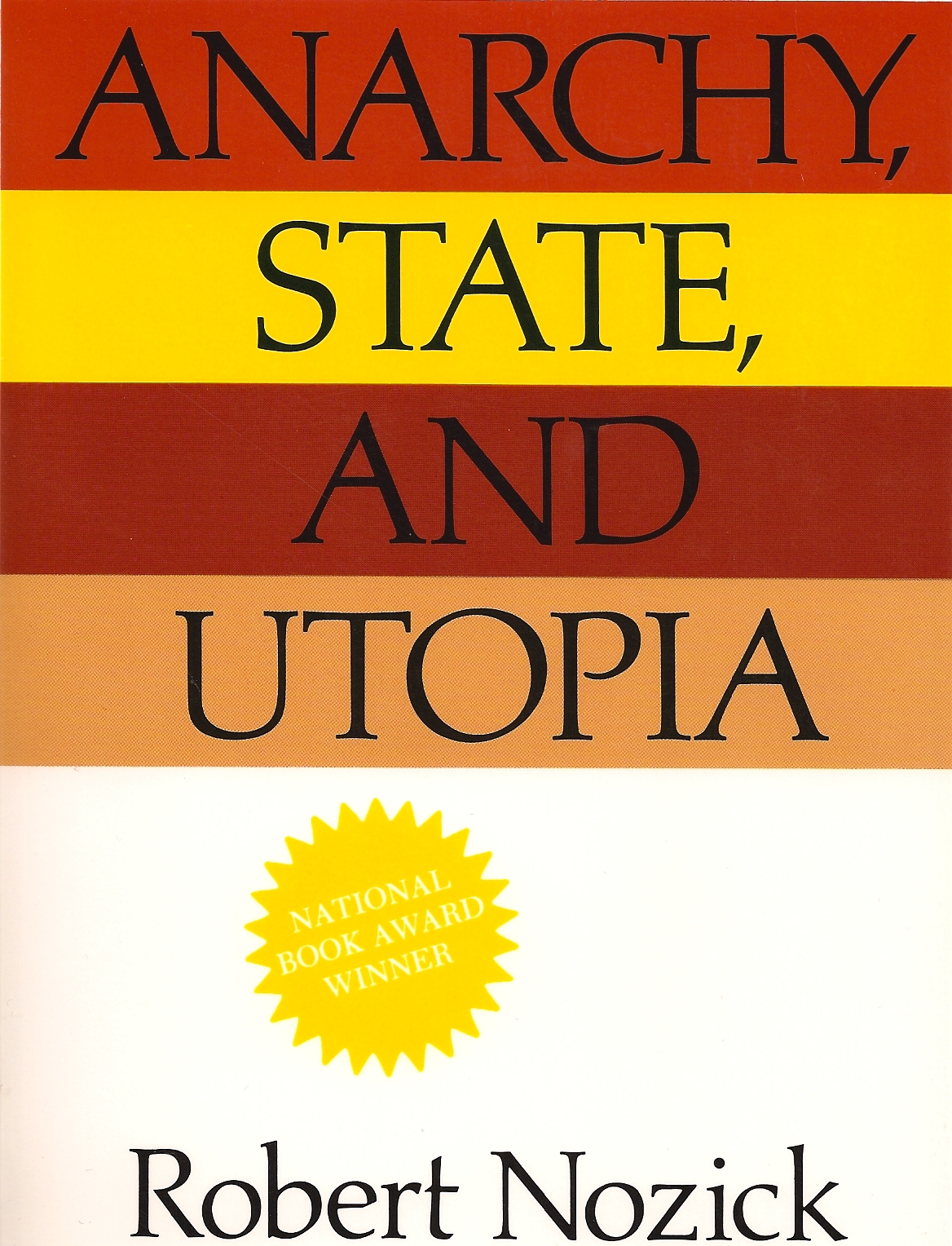
The book reads fast and I definitely recommend it if you’re into this stuff, but in the interest of not taking too much of your time or pasting an obscenely large amount of (copyrighted) text, I’ll just summarize the argument we focused on in class which puts forth a moral basis for the Libertarian viewpoint. The argument begins with the idea of rights as side-constraints, rejecting the idea of the “greater good” and asserting the moral inviolability of individuals. This perspective was inspired by Immanuel Kant’s moral theory that human beings are ends in themselves, and may never be sacrificed or used as mere “means to others’ ends” without their consent.
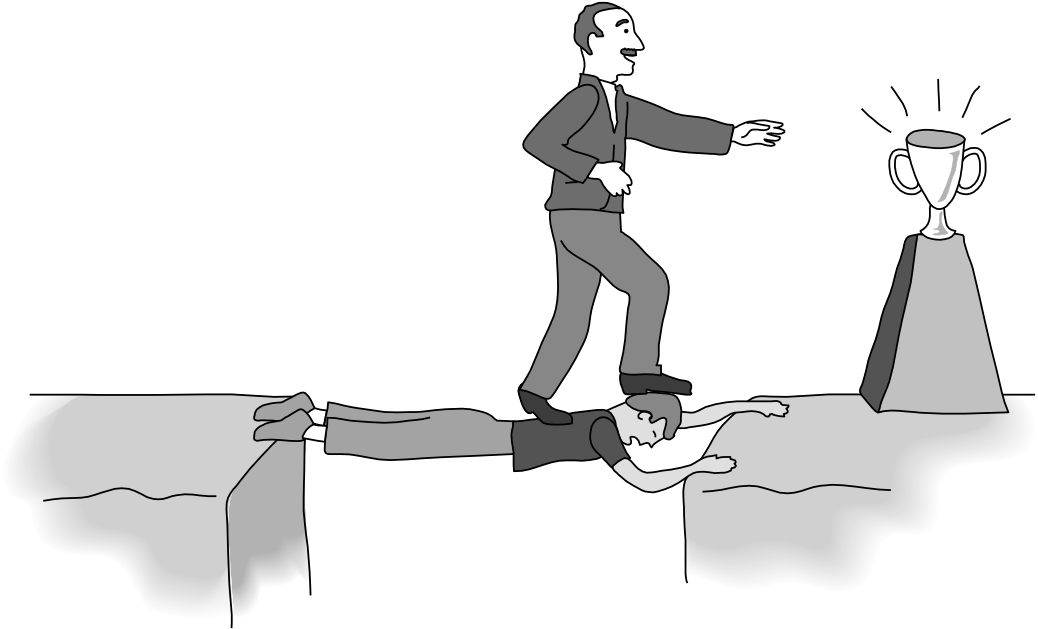
Something you shouldn’t do, according to Kant (image source)
According to Nozick’s formulation, violating a moral side-constraint necessarily entails a violation of one’s rights regardless of the utilitarian benefit that it might allow for others. He then argues that the moral side-constraint relevant to political philosophy is the constraint against the use of force, under which no one may use or threaten the use of physical force against anyone else. If any action violates the moral side-constraint, then it is automatically said to be “unjust,” as is any situation that arises as a result of it.
This idea is importantly intertwined with the concept of consent. Nozick’s thought drew heavily on that of the 17th century philosopher John Locke, who argued that governments can derive their right to coercion only from the “consent of the governed.” For its time, Locke’s work was revolutionary: a man may not call himself king and implement laws upon a territory if its people have not given their sanction. But whereas Locke pragmatically supposed that “implied” consent of the governed could suffice, Nozick took this notion further and believed that expressed consent should be theoretically needed from each individual in order for government coercion to be applied legitimately to them. Otherwise, the governed people’s rights would be violated, as the state would be threatening the use of force (e.g. prison) against individuals for disobeying rules which they had never consented to.
The first part of Anarchy, State, and Utopia is dedicated to imagining how a state could justly arise in accordance with the moral side-constraint against force. Basically, proto-governments arise as “protection agencies,” which are businesses that individuals subscribe to for a fee to protect them and their property from others. Eventually one of the agencies – presumably the most efficient – comes to dominate the market and becomes an “ultraminimal state,” which over time, by a process which is not really relevant enough to detail here, settles into its position as a “minimal state.”
Nozick begins Part II of the book by explaining his ideas regarding private property, or “holdings.” His ideas about how property can come to be originally acquired and transferred to others comprise the substance of his Entitlement Theory. The theory is as follows:
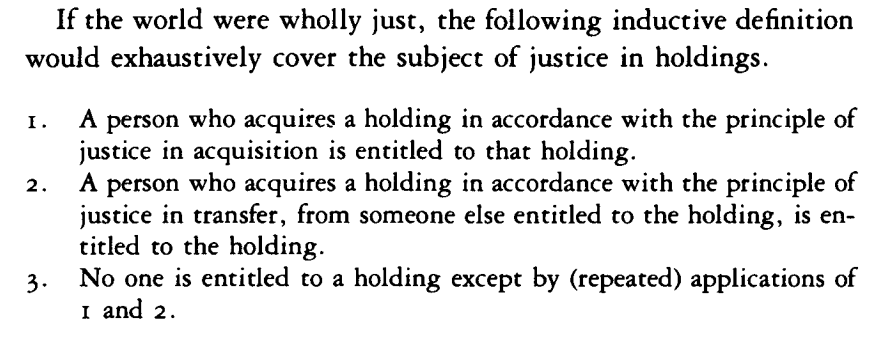
The first part of this theory asserts that an individual justly owns a piece of property if he acquires it in accordance with “justice in acquisition.” Nozick supposes that an individual can justly “appropriate” or claim an unowned object or piece of land as their property so long as no one else can reasonably complain that they are made “worse off” by the act of appropriation. The second part of the Entitlement Theory – “justice in transfer” – stipulates that property may only be transferred (or rented, lent out, etc.) from one owner to another consensually, as in a mutually agreed-upon transaction or contract. Acts of theft and fraud are prohibited here, as they violate the owner’s consent.
Following from these premises, he argues that any attempt by a governing body to interfere with individuals’ property to promote equality or social welfare must necessarily violate their rights. The simplest form of the argument is that redistributive taxation violates the side-constraint against force by coercing individuals to non-consensually renounce the property they justly own at the threat of a prison sentence. With respect to the concept of “equality” or a “fair” distribution, Nozick reminds us that maintaining such an ideal would either force individuals to renounce property that they justly own or forcibly prevent consenting adults from making just property transfers with each other. And then, an additional argument concludes that seizing people’s property and transferring it to others is morally on par with forced labor, because if property is justly acquired as the fruit of one’s labor, taxation to benefit the “social good” would effectively force people to spend some of their working hours for someone else’s benefit. He concludes by this logic that taxing citizens to promote social welfare must necessarily be immoral.
The question we then had to answer in our paper was this:
Does Nozick succeed in showing that all redistribution, other than to return stolen goods, is unjust?
What do you guys think?
Undefined
Have you ever seen one of those proofs that say, 0 = 1, or 1 = 2, or more generally that one number equals a different number which it most definitely does not actually equal? See here:

One of my teachers in high school showed us this proof and asked us if we could find the error. Personally, I followed the logic right to the end and couldn’t see anything wrong with it! But, as many of you probably know (or recognized), the trick to these cutesy proofs is that because a = b, that means that (a – b) equals zero, which we divide by in line 5 to surreptitiously break mathematics. When I saw this, I already knew that dividing by zero was a deadly and forbidden sin, but I didn’t realize we were dividing by zero when we called it “(a – b)”. The reality concealed by the expression eluded me, which led to a wacky and unintuitive conclusion.
One lesson we can draw from this – aside from the perils of division by zero – is that terminology can easily deceive or prevent us from recognizing what’s actually there. A second important takeaway is that the language we use to describe something cannot change what it fundamentally is; in other words, we can call zero whatever we like and it would invariably still be wrong to divide by it. This point also of course applies to logical reasoning, in which a contradiction is still a contradiction even if we change the vocabulary we use to refer to a given thing. The phrase “enhanced interrogation” gives us rosier mental imagery than “torture,” for example, but you could not consistently be “for” one and unconditionally against the other when they refer to the exact same act. You also could not support enhanced interrogation while being against say, “physical or psychological violence,” a more general term under which the act of torture falls.
Of course, this all seems perfectly straightforward when pointed out, but it’s more difficult to recognize in practice. When studying Nozick’s libertarianism, I immediately felt an intuition that something was wrong with it – one which Ms. Rand might explain away as an irrational result of my social upbringing, but which I suspected was logical in origin. Yet, despite its potential to serve as a powerful guide, intuitive thought has the unfortunate shortcoming that it can only take you so far, as in this case, when it alerted me that something was logically suspicious and then refused to say where or what.
I talked to my professor about it and put forth various suggestions about how this could be resolved. I did believe that consent was important and I didn’t see anything wrong with the side-constraint against force, nor did I notice anything objectionable in the Entitlement Theory. I proposed some possible solutions that were conceivable, but not entirely satisfying, kind of like finding a duck-taped box of batteries and wires under the couch when I was really looking for my cell phone (good enough?). My professor wasn’t about to give away any answers, instead preferring a Socratic style which examined thought without really directing it. Though I do remember when I expressed frustration at my confusion, he suggested “maybe you see an issue with original appropriation?” And I said, “huh, I don’t think that’s it.”
Then two days before the paper was due, it sort of hit me, like – waaait a second! I felt like Archimedes in that bath story, which apparently isn’t actually true, though maybe that makes it even more fitting cause he was probably sitting at his desk just like me when the real “Eureka” moment happened. Finally it all made sense, and I could sleep again (but not actually, cause I had to pull an all-nighter the next night to write the paper). And in the next few days even after I turned it in, the full implications of this simple point would gradually become clear and solid to me.
The argument
Firstly: What does the moral side-constraint tell us about what people may and may not do to each other? In its simplest terms, it says I may not use or threaten physical force against others. Thus, regardless of who I am (an aspiring king, a random individual..) I may not declare to you that “you may not do X, or else I will use force to punish or make you compensate me.” Following this, it should be even more clear that I also could not proclaim that, “as a rule, not you or anyone except for me may do X, or else I will force you to repent/repay.” Nozick would easily agree that enforced proclamations of this form are both immoral and unjust in the libertarian sense. “X” could be literally anything, given it is not itself a violent act, e.g. practicing a certain religion, saying something mean about me, or wearing a particular silly hat. Rules of this form may only be placed on people with their expressed consent, as in by consensual contract.
Secondly: what does Nozick tell us about how property can come to be held? Taking inspiration again from Locke, he imagines humanity starting off in a “state of nature,” in which there is no coercive rule or government and the world is originally unowned. In the state of affairs before original appropriation, the only rule is the moral side-constraint, and everyone is at liberty to do anything they like with the material world. Perhaps an individual will be socially shamed for using an object in a way others find objectionable, but morally they cannot be physically harmed or coerced in punishment for it.
Now consider Nozick’s theory of property appropriation. In particular, imagine the hypothetical “State-of-things A,” as I just described, in which no human has yet appropriated property. This is soon followed by a “State-of-things B,” in which the first human has appropriated a piece of land or object as their property. What exactly is the difference between these two scenarios?
On first thought we might say the difference is that “well, property has been appropriated (duh),” but this doesn’t tell us any new information, since the abstract phrase doesn’t describe any tangible difference in reality. Instead, we will have to ask what it means, using non-abstract terms, to “appropriate.” Nozick hints at this tangible, real-world meaning by noting that “whereas previously [others] were at liberty to use the object, they now no longer are” (175). And indeed, by pursuing this elusive definition, it becomes ultimately clear that “appropriation” means that a rule is placed upon the rest of society by the act of the appropriator, in the form of “not you or anyone except for me may do X, or I will use force to punish you or make you compensate me.” This is the relevant difference between scenarios A and B; this is what Nozickian property is. “X” above just becomes “using this given object or plot of land,” and so it logically follows from the side-constraint against force that original appropriation (and by corollary, the entire institution of private property) must necessarily be unjust.
‘Murrica. (image source)
But then, as you might remember, Nozick explicitly declares as a proposition that “appropriation is just” as long as it is done in a way such that no one can legitimately claim that they are made “worse off” by it. So following from the moral side-constraint, the act of appropriation is unjust, while simultaneously a proposition of the philosophy declares it to be just. But the properties of “just” and “unjust” are conceived to be mutually exclusive, and so – as with the activist who opposes “physical and psychological violence” but believes “enhanced interrogation” is okay – Nozick’s philosophy is shown to be contradictory. As the logical analogue of division by zero, a contradiction is enough to make an argument instantly fall apart: see the Principle of Explosion (if a logical system contains a contradiction, then literally any statement can be proven in it), or else the words of Douglas Hofstadter: “contradictions cannot be contained; they infect the whole system like an instantaneous global cancer” (from Gödel, Escher, Bach). I think this contradiction would have been easy to notice if the term “appropriation” had been more transparent, but the reality of the act was concealed by the expression, which led to the wacky and unintuitive conclusions that constitute Nozick’s libertarianism.
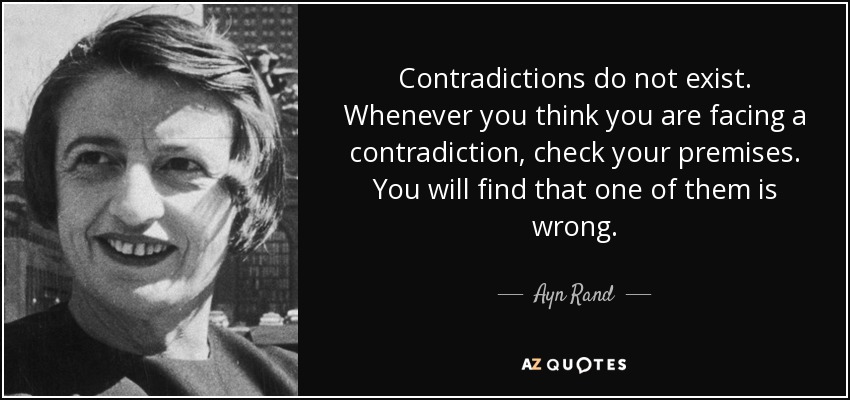
Comrade Rand urging us to reconsider the premise that “property is just.” If you insist, girl
Not quite done though
Anticipating potential responses to an argument you make is really important in most any scenario, but especially so in a philosophy paper, which would literally not be complete without it. Though to clarify, by “potential responses” I’m not really referring to those who are inclined to wave red-and-black flags rising up and/or seizing the means of production at the conclusion that a proper philosophy based on the moral inviolability of individuals’ consent logically cannot incorporate private property. On the contrary, I’m more referring to potential responses by people who still want to believe in Nozick.

Callie and Callie’s mom are both me (Source: Pictures For Sad Children)
So as for possible counterarguments, here are a few of those:
- If it can be said that someone owns his labor, then it makes sense that he also can own any object which he labors to create or improve.
Nozick himself considers this theory (p. 174-175), discussing its difficulties and logical shortcomings and ultimately rejecting it. He adds that, to date, “no workable or coherent value-added property scheme has yet been devised” (175).
- Even if this act normally would violate the side-constraint, it should be “allowed” or considered an exception to the rule based on some special property of its circumstance.
It a valid possibility that property appropriation is permitted as an “exception” to Nozick’s side-constraint, in which a violation is considered unjust except in this special instance. But if this were the case, it would then seem necessary to give some reasoning for it. Certainly something like “intuition” can’t suffice, because that would warrant an impossible explanation of why this single case is arbitrarily chosen from an enormous list of possible exceptions that could also potentially be justified this way. What about a justification on the basis that no one can complain that property appropriation makes anyone worse off? This too is insufficient by the same logic, since it could equally apply to a bunch of other non-consensually imposed rules which would be entirely impermissible to the philosophy. An argument like this basically asserts that a side-constraint violation is permissible if its effect is neutral or a Pareto-improvement. But Nozick explicitly mentions a “prohibition on … using or threatening force for the benefit of the person against whom it is wielded” (34). So even though he argues that property really makes everyone better off, he still believes that this is inadequate as a justification to ignore the side-constraint.
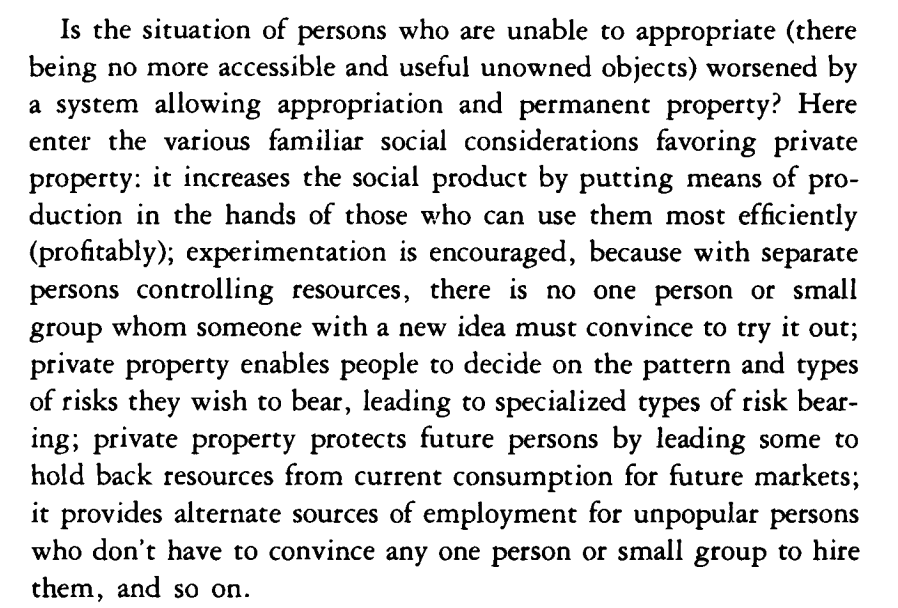
With this out of the way, there is also another way this philosophy could be possible, which is that there is no justification given for why property should transcend the moral side-constraint and that it is permitted entirely arbitrarily. Or in other words, consent is the absolute most important criterion for morality and should be upheld at all costs, except in the one particular instance where a massive and large-scale violation of it allows for the creation of unregulated capitalism, in which case it’s totally fine.. Why? Because Mister Nozick simply declared so.
This is a point I’d like to elaborate on a bit more, because it took me a while to fully understand it, but I’m really glad that I do now. Basically, this point reminds us that the rule or set of rules that creates the institution of property is a human invention, as opposed to a description of how the world works. That is not at all to say that it isn’t a good one, but rather that it could easily and arbitrarily be something different and should be thought of conceptually the same as any other rule or law. To draw an illustrative parallel: some Americans think that no one should be allowed to have abortions, some think that no one should be allowed to have abortions except for early in the pregnancy, and some favor no restrictions at all. And then, with regard to property: Nozick thinks that no one is ever allowed use an object or piece of land claimed by someone else without their consent, John Locke thinks mostly the same except in the case where the person who owns the property is letting it go to “waste” (at which point the owner loses the property right), and Emma Goldman would favor no coercive restrictions at all. Many people might agree that the rule should be “no one may use property owned by someone else, except in the case of democratically agreed-upon taxation to provide public goods.” Other people disagree, and they have their own ideas about what the rules should be. But regardless of anyone’s specific opinion, the point is that there is no a priori justification for favoring the most restrictive conception over any of the others, or viewing it as the “default” from which others deviate. Does that make sense? Honestly, the only real reason I can imagine for favoring it is if simplicity is our supreme criterion.
- The institution of property is a natural law, and not invented by humans themselves.
Before the first act of property appropriation, anyone may do anything they like with any part of the material world. However, it is possible that this is not because there are no rules, but because a pre-existing “natural” rule has not yet become relevant, namely: “no one may use any material object which has been appropriated by someone else.” It might look like the situation is that “I may do what I wish with X object,” but in reality it is that “I may do what I wish with X so long as nobody has claimed it as their property.” I think the subtleness of this point makes it interesting. It is to say that although it appears in this original scenario that everyone is truly free, they are actually living under this preordained law that came from a source outside of humanity such that the side-constraint remains intact when the first human appropriates. Perhaps the gods read Atlas Shrugged and want laissez-faire capitalism on Earth (who knows?) or perhaps we are (again) arbitrarily declaring this as a theoretical proposition.
Epilogue – Rescuing consent
In light of this inconsistency, where can we go from here to form a coherent theory which incorporates property but properly respects each individual’s consent? One thing we could do is to consider what conditions under which we think that, hypothetically, everyone would consent to the institution of property. This solution could allow for the elevated standard of living that a market economy affords, while at the same time attending to issues of exploitation and prospects for equality.

John Rawls was a philosopher at Harvard whose office was right down the hall from Nozick’s. His work is often credited with reviving the field of political philosophy after publishing his groundbreaking book A Theory of Justice in 1971. Central to his philosophy is a simple thought experiment: If a society of rational individuals were put under a “veil of ignorance” as to who they are and then asked to create a society they would live in, what basic structure and institutions would all of them agree to? Rawls argues that the answer to this is one that allows for inequality if it raises everyone’s standard of living, but not if it creates a wealthy class at the expense of those less fortunate. Although his theory is slightly different from the one I suggested to remedy Nozick, it seems superior in being far more tractable, but in much the same spirit.
~
Anyway.. I think that is everything I wanted to cover! This post ended up being much longer than expected (lel sorry) but I hope it was informative and/or thought-provoking. In conclusion political philosophy is fun and you should do it. :’) Also, if you have questions and ideas and stuff, you should give me those too.
